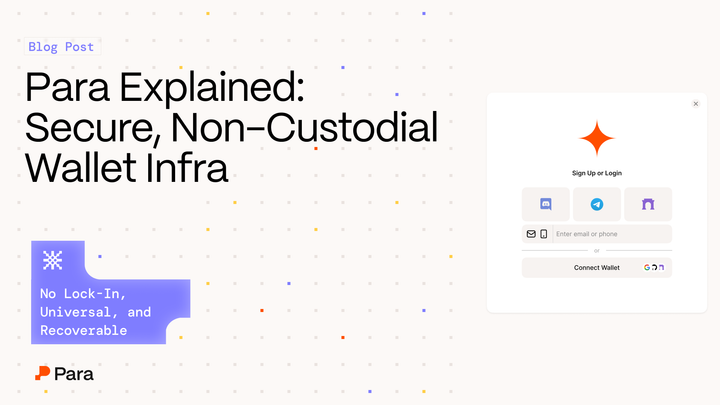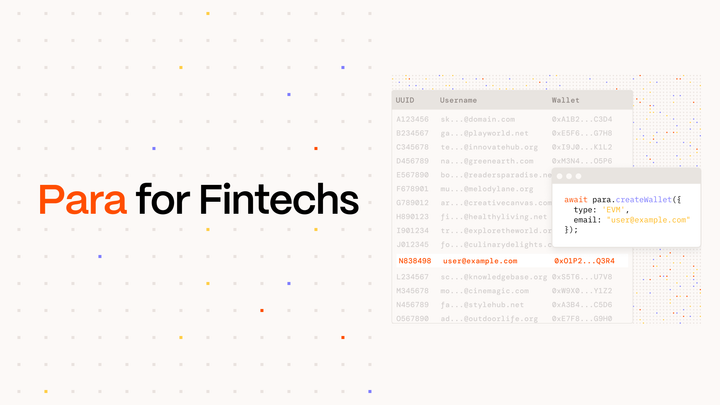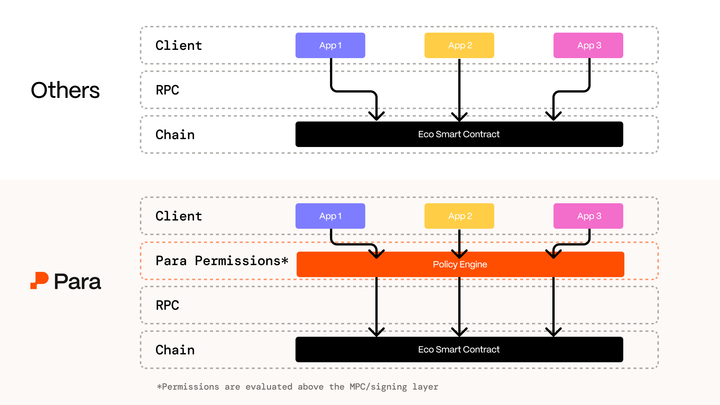✴️
This post assumes familiarity about embedded wallets. If you're looking for an introduction, start with our Embedded Wallets 101 guide.For a deeper dive into cross-app support and Universal Embedded Wallets, check out our latest blog post. If you’re an application developer building with crypto, you’re likely looking for a way to simplify user onboarding. This might lead you to look into embedded wallets.
While there are various embedded wallet solutions that make it easier for end users to own and interact with crypto, deciding how to integrate them into your application can be tricky and involves many considerations.
The Best Wallet Solution
To evaluate the best approach for seamless onboarding, you'll need to weigh factors like:
- Security and its impact on your users
- Performance and latency
- How to differentiate between complex products that can often seem similar
This guide is designed to help you evaluate these solutions, focusing on security, user relevance, and usability. Hope this is helpful!
Para Distributed MPC
Shamir Secret Sharing Products
Secure Enclave Products
MPC Network Products
Security
✅ Distributed MPC across DKGs eliminating the risk of a private key being a single point of failure.
Distributed MPC-enabled keys never have to be recombined to sign transactions.
❌ SSS splits private keys into shards and are combined to reconstruct the private key in a centralized location.
SSS exposes the full private key when generating it and every time it is used.
❌ Secure enclaves are single locations where private keys are stored.
Secure enclaves are not secure enough by themselves for storing private keys due to possible vulnerabilities and counterparty risk.
✅ MPC networks generate private keys in a distributed manner, often leveraging a trusted set of parties that need to reach a threshold to sign a transaction.
Cross-App Support
✅ Para wallets are cross-app and work universally across EVM, Solana, and Cosmos chains.
❌ Signing UX requires the originating app open in order to sign transactions.
Application double-opt-in is also typically required.
❌ No cross-app support. Users will need to export private keys to use an embedded wallet elsewhere.
❌ No cross-app support. Users will need to export private keys to use an embedded wallet elsewhere.
Censorship Resistance
✅ Censorship resistant by default. Private keys cannot be accessed by your application, Para, or anyone but your users. Users can exit Para's system.
❌ Not censorship resistant.
❌ Not censorship resistant.
✅ Censorship resistant. Most MPC networks feature multiple parties that can sign transactions in the instance of an outage.
Performance
✅ Built for scale and supports full horizontal scaling to ensure sustained performance.
❓ Varies by provider.
❓ Varies by provider.
❌ Because many parties are required to participate in signing, latency and scalability are often more difficult to achieve.
Recovery
✅ Supported recovery out of the box.
❓ Varies by provider.
❓ Varies by provider.
❓ Varies by provider.
Multi-chain Support
✅ Supported across EVM, Solana, and Cosmos chains.
❓ Varies by provider.
❓ Varies by provider.
❓ Varies by provider.
Passkey Support for Key Management
✅ Passkeys are used to decouple access from authentication ensuring that wallets are never compromised even if the social login is.
❌ Many providers use passkeys as a replacement for authentication.
❌ Many providers use passkeys as a replacement for authentication.
❌ Not usually supported out of the box.
Social Login + Phone Number Support
✅ Supported with an easy-to-use modal.
❓ Varies by provider.
❓ Varies by provider.
❌ Not usually supported out of the box.
Server SDK Support
✅ Supported.
❌ Not supported.
❌ Not supported.
❌ Not supported.
Pricing
Para offers a free tier to help teams get started, with transparent usage-based pricing that scales alongside your growth. For other products, consult their websites or reach out to the teams directly for details.
How Para Enables Seamless Embedded Wallet Integration
Para gives you everything you need to embed wallets directly into your app with no popups, no extensions, and no compromises on security. From instant passkey logins to in-app signing on web and mobile, Para makes wallet interactions feel native. It’s developer-friendly infra that unlocks better UX for your users and fewer support tickets for your team.
To learn more about how Para uses Distributed MPC, get in touch via Twitter or email us at hello@getpara.com. If you're a developer who would like to get started with Para, create an account in our Developer Portal.




